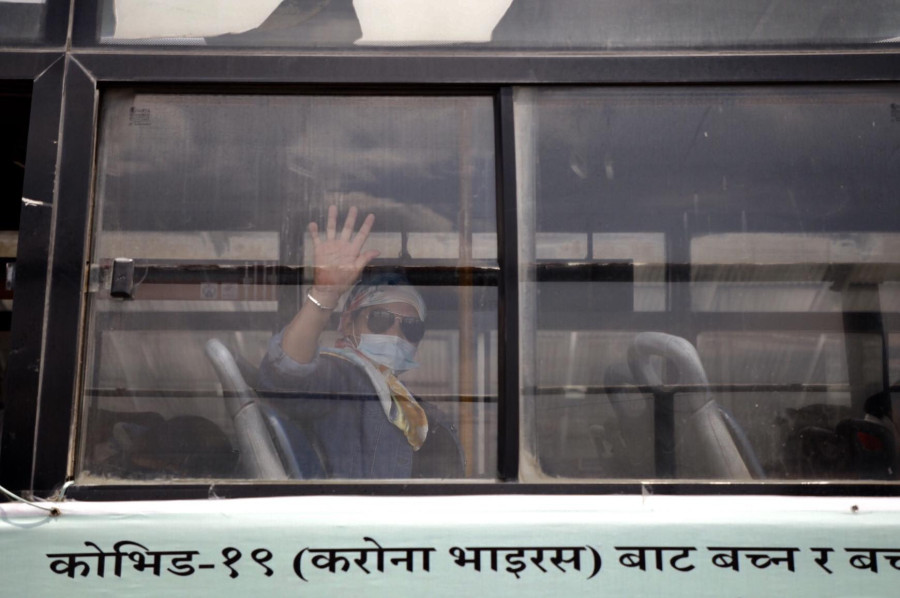National
Making migrant workers pay for Covid-19 screening adds to their desperation
While Nepalis working abroad are already asked to pay for chartered flights, burdening them with the cost of testing makes their repatriation more difficult.
Chandan Kumar Mandal
Around 300 Nepali migrant workers landed at the Tribhuvan International Airport on Thursday, all of them with medical certificates on coronavirus infections. They got tested for free at the Kuwait airport, along with free flight tickets home, as they had signed up for the Kuwaiti government’s general amnesty.
The Nepal government’s repatriation plan said that everyone coming to Nepal via flights must have a certificate of a medical test proving that they have not contracted coronavirus. They should carry a physical copy of the test result, which should be older than seven days.
However, the government’s plan did not mention who will be responsible for conducting the test—the Nepal government, Nepal embassy, host government or the workers, and this has created confusion among workers who wish to return home. Besides, who would be bearing the expenses of these tests is a sensitive issue, as migrant rights activists have already been slamming the government for imposing repatriation costs on workers.
According to Som Luitel, a lawyer with expertise on migrant workers’ rights, such provisions have created confusion among workers.
“The decision lacks clarity. Some workers who have money may pay for their tests, but what about others who can not bear the cost,” Luitel told the Post. “On one hand, the government has said the stranded workers would be brought home but on the other hand, the workers are asked to mandatorily produce test results and pay for their own tests. How can those stranded workers, without jobs and money, be able to pay for the test?”
During discussion last week, ambassadors from Persian Gulf countries like Qatar and Saudi Arabia, as well as Malaysia, had sought more clarity from the Nepal government regarding the repatriation plan, especially on repatriation costs and the requirement for workers to produce health examination certificates for returning home.
They said they were concerned about who would be conducting the tests and who would be paying for them. Their concerns had stemmed from the fact that host countries were hesitant to conduct medical examinations of returnee workers because of their large numbers and also because their health facilities were already overwhelmed in the wake of the pandemic.
“We had requested the Qatar government to conduct PCR or RDT tests on the returnees, but it said it would not be able to test all workers. So now, only thermal temperature screening would be possible,” Narad Nath Bhardwaj, Nepali envoy to Qatar, told journalists. “We have written to the Foreign Ministry saying a private health facility has agreed to conduct tests at the cost of Qatari Riyal 125. If not possible, then these workers would be tested in Nepal only.”
Mahendra Prasad Singh Rajput, the Nepali ambassador to Saudi Arabia, had also said the government needs to clarify the cost and type of medical examination it wants the workers to undergo.
“We need enough time to deem our workers fit to fly,” said Rajput. “The health of our workers is of supreme significance. But there should be clarity on what kinds of tests to conduct and who pays for it.”
Now embassies have issued notices asking Nepali workers to conduct tests on their own. Nepal embassy in Malaysia has published names of clinics and hospitals authorised by the Malaysian government for Covid-19 screening and informed Nepali workers to get tested at their own expense. According to Luitel, the Nepal government should lobby for managing these tests expenses on workers’ behalf.
“Conducting Covid-19 tests is also the responsibility of the employer and the host nation. This is not something that they cannot do,” said Luitel. “Employers should pay for such tests as part of their corporate social responsibility, but the Nepal government did not give much consideration to this issue.”
Luitel urged that a diplomatic initiative can come handy in making employers pay for workers’ Covid-19 screening.
“Now there are joint committees consisting of Nepali officials and officials from labour destination countries like Malaysia and UAE. They could have met through a virtual meeting to solve this issue,” said Luitel. “The Nepal government can tell the host governments to ask employers of workers whose tenure is still valid to pay for their Covid-19 tests. If only our government can take the initiative, we could ensure free health screening for our workers.”




 16.12°C Kathmandu
16.12°C Kathmandu














